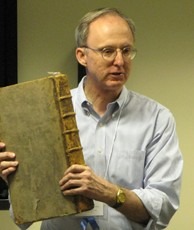G-10v. Descriptive Bibliography: The Fundamentals
David R. Whitesell
Length: 10 hours
Format: Online
This 10-hour online course is intended for persons who desire a better understanding of the physical examination and description of printed books, especially of the period 1550–1850. It is designed both for those with little formal exposure to this subject and for those with some general knowledge who seek a systematic discussion of (or refresher to) the elements of physical description as set forth in Fredson Bowers’ Principles of Bibliographical Description.
This abbreviated course differs from G-10 in that it focuses more narrowly on the creation of a basic bibliographical description, or formulary: a statement consisting of a book’s format and collational formula (a condensed description of the gatherings comprising a book and the order in which they are intended to be bound, the number of leaves per gathering, and the manner in which the gatherings are signed and the leaves paginated). Other topics to be touched upon include ideal copy, edition, issue, and state, the limitations of descriptive bibliography, and its application to broader research questions.
Because this course lacks a formal laboratory component, students who complete the course will be comfortable reading complex bibliographical descriptions but will likely need further training before being able to produce accurate bibliographical descriptions on their own. During the course week, however, students are encouraged to practice describing several pre-1850 books they may have access to. Each student may schedule an online tutorial with an instructor to review their draft descriptions and resolve basic questions of procedure, evidence, and description. These optional online tutorials are likely to be scheduled during the week following the course.
In their personal statement, applicants should describe the extent of their background in bibliography, the nature of their interest in the subject, and how they expect to apply what they learn. There is no formal prerequisite for the course, though students with little prior exposure to pre-1850 books may be directed to other Rare Book School course(s). Students who have some prior background in bibliography or who have taken either G-10 or G-20, but seek a comprehensive refresher in bibliographical fundamentals, are encouraged to apply.
Click here to view the course description for the in-person version of this course, “Introduction to the Principles of Bibliographical Description.”
Course History
Faculty

David R. Whitesell
David R. Whitesell retired as Curator in the Albert and Shirley Small Special Collections Library at the University of Virginia in 2022. He previously worked as Curator of Books at the American Antiquarian Society, Rare Book Cataloger at the Houghton Library, Harvard University, and in the antiquarian book trade. He has served as Secretary of the Bibliographical Society of America and as a Trustee of the American Printing History Association. His publications include First Supplement to James E. Walsh’s Catalogue of the Fifteenth-Century Printed Books in the Harvard University Library (2006); he also was Associate Editor for Spain, Portugal, and Latin America for the Oxford Companion to the Book (2010), and Editor of Roger Stoddard’s A Bibliographical Description of Books and Pamphlets of American Verse Printed from 1610 Through 1820 (2012; winner of the MLA Prize in Bibliography). Among the exhibitions he has curated are In Pursuit of a Vision: Two Centuries of Collecting at the American Antiquarian Society (2012) and A Curator’s Wunderkammer: A Decade of Collecting for the University of Virginia (2022).
